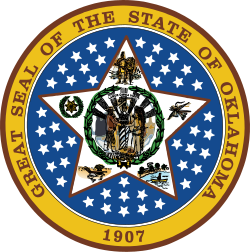This article needs additional citations for verification .(March 2020) |
 Great Seal of Oklahoma | |
| Agency overview | |
|---|---|
| Formed | 1976 |
| Headquarters | 421 NW 13 Street Oklahoma City, Oklahoma |
| Employees | 37 unclassified |
| Annual budget | $100 million |
| Minister responsible | |
| Agency executive |
|
| Website | District Attorneys Council |
The Oklahoma District Attorneys Council is an agency of the state of Oklahoma that provides professional organization for the education, training and coordination of technical efforts of all Oklahoma state prosecutors and to maintain and improve prosecutor efficiency and effectiveness in enforcing the laws of the state. The Council distinguishes itself from the District Attorneys Association, a private organization, in order to lobby the legislature, though it is composed of the same members. [1]
Contents
- History
- Functions
- Leadership
- Council members
- Divisions
- Lobbying and controversies
- Lobbying efforts
- Lobbying against other bills
- Accusations of Corruption
- See also
- References
- External links
The council is composed of five members, one of which is the Attorney General of Oklahoma and the remaining four are sitting District Attorneys. The council is responsible for appointing an Executive Coordinator to act as chief executive officer of the council. The current Executive Coordinator is Kathryn Boyle Brewer.
The council was established in 1976 during the term of Governor of Oklahoma David L. Boren.
